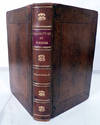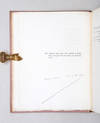
No Cross, No Crown: Or several Sober Reasons against Hat-Honour, Titular-Respects, You to a single Person, with the Apparel and Recreations of the Times... In Defence of the poor despised Quakers, against the Practice and Objections of their Adversaries.
by PENN, William
- Used
- Hardcover
- first
- Condition
- See description
- Seller
-
London, United Kingdom
Payment Methods Accepted
About This Item
[London:] printed [by Andrew Sowle] in the year,, 1669. Penn's controversial guide to practical Christianity, bound within a Quaker Sammelband First edition of the Quaker theologian's "most ambitious and most learned work" (PMM), an eloquent and inflammatory dissertation upon the importance of the Christian duty of self-sacrifice. It is bound here with The Quakers Catechism (1655) by Richard Baxter, a fierce opponent of Penn, and Some Principles of the Elect People of God In Scorn called Quakers (1671) by George Fox, the Quaker founder with whom Penn "created a coherent Quaker philosophy" (ODNB). No Cross, No Crown was composed while Penn (1644-1718) was confined in the Tower of London for nine months for the "blasphemy" of his unlicensed tract, The Sandy Foundation Shaken (1668), which criticised what were then considered self-evident Christian truths, such as traditional interpretations of the Trinity, the doctrine of justification, and Christ's atonement. Undeterred by the threat of life imprisonment, and in a deliberate misuse of the writing materials provided for his hoped-for retraction, Penn wrote the present work. Penn argued that external expressions of respect such as titles and clothing - "hat-honour" - were falsehoods in comparison to the true honour gained from simple and unceremonial service to God. It was printed at the author's expense and distributed free to all interested parties. In both his writings and his actions, Penn "devoted his life to securing liberty of conscience as a God-given right beyond the dominion of government. Penn's aspirations culminated in the founding of Pennsylvania [in 1681], a 'holy experiment' dedicated to the idea of religious freedom... As the colony's sole proprietor and the framer of its early constitutions, he was afforded an opportunity to create a utopian society premised on Quakerism" (Adams & Emmerich, p. 58). No Cross, No Crown is bound after the following two works: 1) BAXTER, Richard. The Quakers Catechism, or, the Quakers questioned, their questions answered, and both published... London: printed by A.M. for Thomas Underhill, and Francis Tyton, 1655. [26], 30 [i.e. 32] pp. Woodcut headpiece, divisional bands, and initials. First edition, one of several type settings noted by ESTC, which states that "the relationship of the various 1655 'editions' remains to be worked out. There appears to be a fair amount of shared setting". The ejected minister and prolific religious writer Richard Baxter (1615-1691) objected to what he considered to be Penn's hypocrisy, lecturing on simple living "while hee swims himselfe in wealth". Baxter and Penn engaged in a seven-hour public debate on Quakerism on 5 October 1675, which prompted a brief, combative correspondence. One of the better known responses to Baxter's pamphlet is James Nayler's An Answer to a Book Called the Quakers' Catechism (1655). This copy of The Quakers Catechism has the following points: A1v bears six bible verses and closes with "Reader I entreat thee..." (described as a variant issue by ESTC R207366); "catechism" and "Richard" are spelled correctly on the title page and the "r" in "Anchor" is printed below the line of type; the caption title on A4v prints the "i" in "in" directly above the "l" in "England"; and the caption title on page 1 has no full stop and aligns the "q" of "queries" below the "u" of "Quakers". ESTC R28362, R207366, & R13360 [this copy a combination of several points from each]; Orme, "Chronological List", 23. 2) [FOX, George, Isaac Penington, & others.] Some Principles of the Elect People of God In Scorn called Quakers. [London: no publisher,] 1671. [4], 122 pp. Second, greatly expanded, edition of a 39-page work by George Fox (1624-1691) originally published in 1661 but here enlarged with contributions from notable Quaker defenders such as Isaac Penington (1616-1679). Penn developed a close relationship with Fox in the 1660s. He supported Fox through several challenges to his leadership, including Wilkinson-Story controversies, "the most serious and widespread of those that racked Quakerism in the later seventeenth century" (ODNB). Penn also gave Fox a sizeable plot of land in Philadelphia. In later years, however, "relations between [Fox] and the royalist-inclined Penn soured... Fox considered his younger associate contaminated by his closeness to kingly power" (ibid.). Penn nevertheless contributed a lengthy preface to Fox's posthumously published Journal (vol. I, 1694). ESTC R33049; Smith, Descriptive catalogue of Friends' books I, pp. 665 & 671 and II, p. 352. Bound third in a Sammelband of three works, small quarto (175 x 130 mm). Nineteenth-century polished calf, rebacked to style with red label, gilt-tooled compartments, and raised bands, dated at foot, double fillet and triangle roll border to boards in gilt, board edges and inner dentelles gilt, edges sprinkled red. Housed in a brown quarter morocco solander box by the Chelsea Bindery. Roman and italic types. Extremities expertly refurbished, boards slightly splayed with small patch of stripping to rear; endpapers browned from turn-ins, each title page sequentially numbered in a neat early manuscript hand at top right corner (with p. 5 of the Penn numbered "4:"), contents evenly browned throughout (gathering F of the Penn more so, and spotted), a few leaves cropped close in the binding process (in most cases just slightly shaving page numbers or signatures; in the Penn, affecting one or two letters per line of shoulder notes on pp. 36, 68, and 84, sense recoverable), a handful of minor chips and small tears, the latter due to paper flaws, tiny paper infill at lower corner of Penn's K4. Overall in very good condition. ESTC R15257; Printing and the Mind of Man 150; Sabin 59721; Smith, Descriptive catalogue of Friends' books II, p. 284; Wing P1327. Arlin Adams & Charles Emmerich, "William Penn and the American Heritage of Religious Liberty", Journal of Law and Religion, 8:1/2, 1990, pp. 57-70.
Reviews
(Log in or Create an Account first!)
Details
- Bookseller
- Peter Harrington
(GB)
- Bookseller's Inventory #
- 158807
- Title
- No Cross, No Crown:
- Author
- PENN, William
- Book Condition
- Used
- Binding
- Hardcover
- Place of Publication
- [London:] printed [by Andrew Sowle] in the year,
- Date Published
- 1669
Terms of Sale
Peter Harrington
All major credit cards are accepted. Both UK pounds and US dollars (exchange rate to be agreed) accepted. Books may be returned within 14 days of receipt for any reason, please notify first of returned goods.
About the Seller
Peter Harrington
Biblio member since 2006
London
About Peter Harrington
Since its establishment, Peter Harrington has specialised in sourcing, selling and buying the finest quality original first editions, signed, rare and antiquarian books, fine bindings and library sets. Peter Harrington first began selling rare books from the Chelsea Antiques Market on London's King's Road. For the past twenty years the business has been run by Pom Harrington, Peter's son.
Glossary
Some terminology that may be used in this description includes:
- Leaves
- Very generally, "leaves" refers to the pages of a book, as in the common phrase, "loose-leaf pages." A leaf is a single sheet...
- First Edition
- In book collecting, the first edition is the earliest published form of a book. A book may have more than one first edition in...
- Shaken
- A hardcover in which the text block is loose, but still attached to the binding.
- Edges
- The collective of the top, fore and bottom edges of the text block of the book, being that part of the edges of the pages of a...
- Fair
- is a worn book that has complete text pages (including those with maps or plates) but may lack endpapers, half-title, etc....
- Quarto
- The term quarto is used to describe a page or book size. A printed sheet is made with four pages of text on each side, and the...
- Title Page
- A page at the front of a book which may contain the title of the book, any subtitles, the authors, contributors, editors, the...
- Rebacked
- having had the material covering the spine replaced. ...
- Gilt
- The decorative application of gold or gold coloring to a portion of a book on the spine, edges of the text block, or an inlay in...
- Raised Band(s)
- Raised bands refer to the ridges that protrude slightly from the spine on leather bound books. The bands are created in the...
- Morocco
- Morocco is a style of leather book binding that is usually made with goatskin, as it is durable and easy to dye. (see also...
- Calf
- Calf or calf hide is a common form of leather binding. Calf binding is naturally a light brown but there are ways to treat the...







